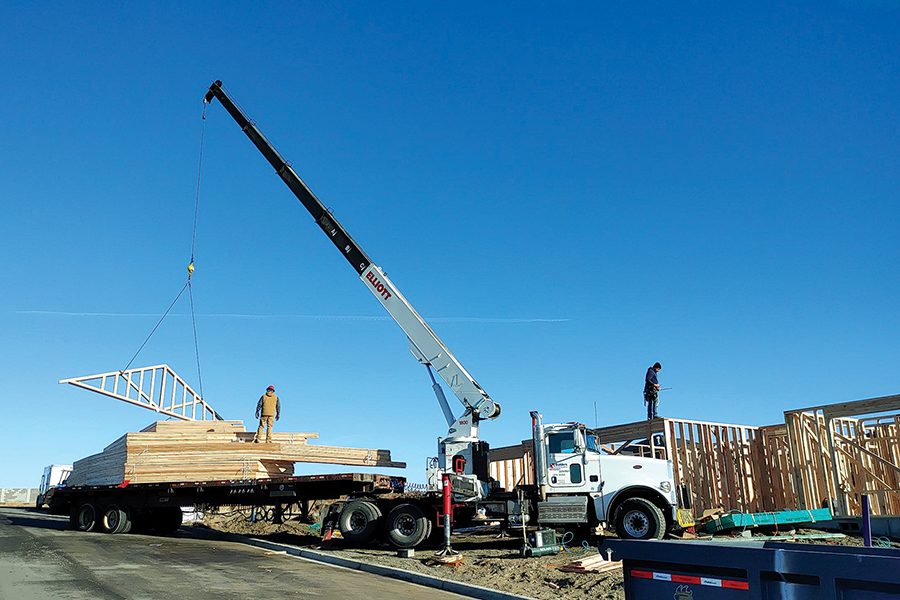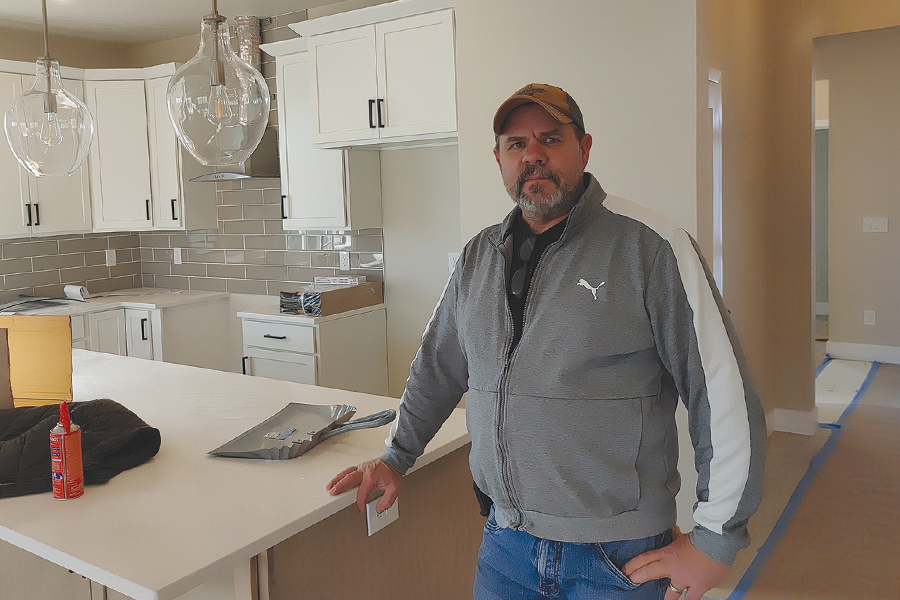
Home » Tri-City housing market slows but buyers are still out touring
Tri-City housing market slows but buyers are still out touring

January 11, 2023
The crystal ball gives no clear picture of what 2023 holds for the Tri-City residential real estate market. The new year started as a study in contrasts.
Home starts sputtered in 2022, as did sales, though prices remained strong.
The word “standstill” gets thrown around, but it falls short of describing the market.
Employment and wages remain strong, which bodes well for a strong market. So does the tight supply of housing – rental and for sale. On the flip side, interest rates doubled in 2022 amid a battle against inflation that topped 8%.
Against the confusing backdrop, Dave Retter was mostly unsurprised when 30 or so people spent the first days of the year touring model homes in the Siena Hills subdivision, a collection of new homes priced from the $500,000s to mid-$700,000s in the saddle of Little Badger Mountain in south Richland.
Retter, president of Sotheby’s International Realty | Retter & Company, acknowledged the last three months of 2022 brought the market to a near halt. But customers pouring through doors suggests business is not grim.
“I’ve never been ‘dam the torpedoes and rah rah rah,’ but when we have 30 people visit one site, that tells us that our 90 days of sticker shock is over,” he said. The 90 days refers to the fourth quarter of 2022, when buyers were put off by rising interest rates, a contentious mid-term election and, in December, by persistently icy weather.
Don Tanninen, owner of Stellar Homes LLC, builds upward of 15 homes a year and is focused on Siena Hills.

He’s got six in construction. He stopped by on a sunny day to check one home before workers lifted roof trusses into place, remove debris from another and install a gas stove at a third.
He’s avoided supply chain issues by stockpiling building materials, including heat pumps. When he applies for a permit, he’s able to build in a matter of months.
Tanninen said the local market has a ceiling of about $600,000, so he works to stay below that. His newest home has three bedrooms and two bathrooms and a $574,900 price tag.
Tanninen, whose brother Bruce operates Tanninen Homes, is not an outlier. Homes are still being built. But plenty of his peers have pulled back.
New home starts stalled in 2022. Local homebuilders secured permits for 1,100 single-family homes from Mid-Columbia permitting agencies, according to year-end figures compiled by the Home Builders Association of Tri-Cities. Prosser numbers were not available and are excluded from the final tally.
The number of homes begun in 2022 was 28.5% lower than the 2017-21 average of 1,553 permits when Prosser is factored out.
The average value of home construction was just over $400 million, 14.6% below the five-year average, even without adjusting for inflation.
The HBA said no community was spared.
“Whether it’s Benton County, Kennewick, Pasco or Richland, they’re all down,” said Jeff Losey, executive director of the home builders’ group.
The Tri-City Association of Realtors has not released market figures for December, but there were 3,873 sales through November, 17% fewer than the same period in 2021.
The average price of $465,000 and an average median price of about $430,000 were up 16% and 13%, respectively.
The Federal Reserve’s relentless series of interest rate hikes in support of its target inflation rate of 2% is the big driver of residential real estate in 2022.
In December, it raised the federal funds rate by half a percentage point, capping a year that saw seven rate hikes. Jerome Powell, chair, signaled it will keep raising the funds rate in 2023.
The average rate for a 30-year fixed-rate mortgage was 6.48% in early January, according to Freddie Mac, created by Congress to provide capital to the mortgage industry.
That’s double the 3.22% average of a year prior.
Retter advises buyers not to be too nostalgic for 3% mortgages. Barring another pandemic, they’re not coming back. The 50-year average on a 30-year, fixed-rate mortgage is 7.76%, he said.
He said local lenders have adapted their lending products to take off the edge. Buyers are in a better position to negotiate concessions from sellers, including buy downs that can lower the interest rate to 5.25%.
His message to buyers hoping for better prices is blunt.
“If they don’t want to buy at five and a quarter because they think that interest rate is too high, they’re never going to buy a house in their lives,” he said.
Retter and other real estate executives worry a construction slowdown will exaggerate the ongoing housing shortage.
The inventory of for-sale homes stood at 447 heading into the slow Christmas season, well below the 1,200 that is considered balanced.
Losey said the economy is strong and there’s no sign of layoffs, but there is uncertainty,
The Tri-Cities amped up to accommodate the twin distribution warehouses constructed for Amazon Inc. in eastern Pasco. Construction is complete, but the Seattle e-commerce giant is now contracting, not expanding.
On Jan. 4, Amazon CEO Andy Jassy said the company would eliminate over 18,000 jobs, including those trimmed in late 2022. The distribution center is apparently paused.
Losey said that’s the kind of news that can change demand.
“The builders build to what the demand is,” he said.
Pressed to predict how 2023 will shake down, he said he is hoping it will run “parallel” to 2022, without a significant drop.
Travis Davis, the new president of the Tri-Cities Association of Realtors, and his managing broker, Glen Gosch, of Coldwell Banker Tomlinson, are among those who won’t engage in forecasting.
Gosch notes he would have been flat wrong if he’d given a prediction in the first weeks of the Covid-19 shutdowns, when the economy came to a standstill. He would have predicted a crash and not the boom that accompanies the pandemic and drove prices by double digits for three years and counting.
“It’s hard,” he said.
Both men welcome the calmer market and the importance of executing on basic business skills. That includes serving as experts to clients, whether they are first-time homebuyers or luxury home sellers.
And they are confident the market will continue to register sales. Life does not stop because interest rates aren’t low.
“There are life events that happen every day that create the need to buy or sell property. People are having children. Children are going off to college. People are getting married. People are getting divorced,” Davis said.
Retter predicts calmness. All the factors that stabilize the Mid-Columbia economy while Seattle, Portland and other urban areas struggle are firmly in place: federal spending at Hanford and the Pacific Northwest National Laboratory, a lively agriculture and food processing industry and a sprawling health care industry.
“We’re going to buck the trend again. We’re going to sell through a national recession. We’re lucky to be in the Tri-Cities.”
Real Estate & Construction Local News
KEYWORDS january 2023





